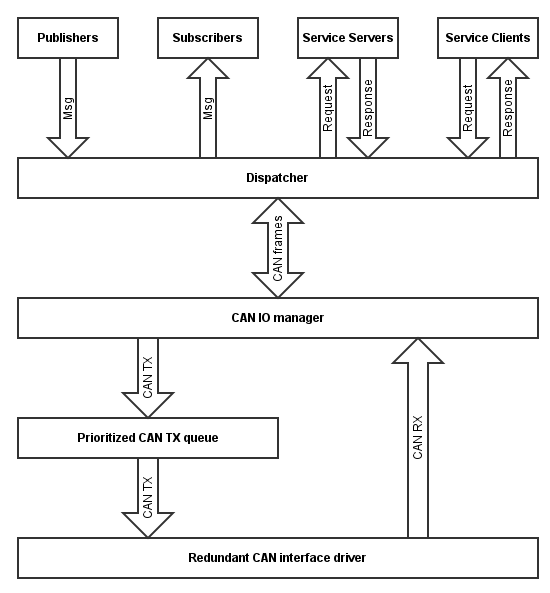Libuavcan
Libuavcan is a portable, cross-platform library written in C++ with minimal dependency on the C++ standard library. It can be compiled by virtually any standard-compliant C++ compiler and can be used on virtually any architecture/OS. Libuavcan is free to use for anyone under the terms of the MIT open source license.
Libuavcan is implemented in two components:
- Cross-platform core. This is the largest component that implements the entire UAVCAN stack in a platform-independent way.
- Platform-specific drivers. These are thin layers that adapt the core for a particular OS/architecture. Drivers are separated from the core by a few C++ interface classes. There are default drivers available for some popular platforms (e.g., Linux, STM32, LPC11C24).
The libuavcan core can be compiled in either C++03 or C++11 mode.
In the latter case, some extra features are enabled (e.g., callbacks will be implemented through std::function
instead of through raw function pointers).
In C++03 mode, the implementation has almost zero dependency on the C++ standard library,
which allows to use the library on platforms with very limited C++ support.
C++11 mode though requires many parts of the standard library (e.g., <functional>).
The library can detect the actual C++ standard in use at compile time,
but this can be overridden to force the older C++ standard if desired
(e.g., if the application is compiled in C++11 mode but the full standard library is not available).
The library supports a few compile-time configuration options via preprocessor symbols that allow to fine-tune the implementation for a particular platform/application; in most cases though, it’s not required because there’s either a safe default value or an auto-detect setting provided for each configuration option.
The implementation also features the following properties that render the library suitable for deeply embedded and real-time systems:
- Zero use of the heap (a custom built-in block memory allocator is implemented, which is deterministic and fragmentation free).
- No C++ exceptions are used by default, but the library can be configured via preprocessor symbols to throw exceptions if a fatal error occurs (e.g., unexpected null pointer, boundary check failure, etc.).
- No run-time type identification (RTTI) is used.
- The source code is partially compliant with MISRA C++ 2008.
- The code is unit tested and validated using strong static analysis tools.
The source code is available here: https://github.com/UAVCAN/libuavcan.
Build dependencies
The following software must be installed on the host computer in order to build the library:
- Either Python 2.7 or Python 3.x - needed for the DSDL compiler.
- A suitable C++ compiler (see below).
- Additional dependencies, if any, depending on the environment. Please read the documentation related to your platform (refer to subsections) for more information.
C++ compiler requirements
C++11
- IEEE754 floating point
- At least the following headers of the C++ standard library must be available:
cassertclimitscmathcstddefcstdiocstdlibcstringcstdintcfloatcerrnofunctional
C++03
- IEEE754 floating point
long longandunsigned long longinteger types- At least the following headers of the C++ standard library must be available:
cassertclimitscmathcstddefcstdiocstdlibcstring
- The following headers of the C standard library must be available:
float.hstdint.hstdio.h
DSDL compiler
Libuavcan has a DSDL compiler that converts DSDL definitions into libuavcan-compatible header files (*.hpp).
The compiler is titled libuavcan_dsdlc, and it is invoked as follows:
libuavcan_dsdlc source_dir
Where source_dir is the root namespace directory containing the data type definitions to be compiled,
e.g. dsdl/uavcan.
Please use libuavcan_dsdlc --help to obtain more detailed usage information.
You must invoke the DSDL compiler during your build process before compiling your application and/or the library. For example, if you are using Make, a possible way to invoke the DSDL compiler is as follows:
$(info $(shell $(LIBUAVCAN_DSDLC) $(UAVCAN_DSDL_DIR)))
UINCDIR += dsdlc_generated
For more information, refer to the examples specific to your target platform.

